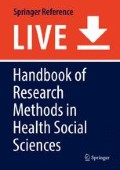Abstract
Critical theory situates science within the quest for social and political rationality. It indicates that science’s normativity – which answers the question “what should science do?” – orients itself in relation to the a priori potential of society. The latter for critical theory transforms itself into concrete political vindications for science. Adorno’s Gesamtgesehen, which differentiates from any total and, therefore, totalitarian conception of what science is, along with Horkheimer’s dialectical approach to science through interdisciplinarity and Habermas’ notion of communicative rationality (that emphasizes scientific dialogue) in science, finds themselves in marked contrast to the rest of modern epistemology. The chapter traces the epistemology of critical theory of the Frankfurt School through the twentieth and the twenty-first centuries via the concepts of dialectics, critique, reason, interdisciplinarity, communicative action and rationality, and their social and political function and role within modernity. The main aims of twenty-first-century epistemology of critical theory become as follows: formulate a theory of normative rationality, reclaim commitments to rational praxis, and educate the sciences to maintain dialectics as their pivotal scope and method of advance.
Some parts of the chapter are based on previous elaborations in my Critical Theory and Epistemology: the Politics of Modern Thought and Science (Manchester University Press, 2017). I owe particular thanks to Professor Darrow Schecter and Professor Piet Strydom for all the inspiring discussions, comments, and critique which encouraged me to reconsider many things.
References
Adorno TW. Zur Metakritik der Erkenntnistheorie, Drei Studien zu Hegel. Gesammelte Schriften, vol. 5. Frankfurt am Main: Suhrkamp; 1970.
Adorno TW, Albert H, Dahrendorf R, Habermas J, Pilot H, Popper KR. The positivist dispute in German sociology. London: Heinemann; 1976.
Arato A, Gebhardt E, editors. The essential Frankfurt school reader. New York: Continuum; 1998.
Habermas J. Knowledge and human interests. Boston: Beacon Press; 1971.
Habermas J. Theory and practice. London: Heinemann; 1974.
Habermas J. The philosophical discourse of modernity. Cambridge, MA: Polity Press; 1987.
Habermas J. On the logic of the social sciences. Cambridge, MA: Polity Press; 1988.
Habermas J. Political communication in media society: does democracy still enjoy an epistemic dimension? The impact of normative theory on empirical research. Commun Theory. 2006;16:411–26.
Horkheimer M. Critical theory, selected essays. New York: Herder and Herder; 1972.
Horkheimer M. Gesammelte Schriften, Band 3, Schriften 1931–1936. Frankfurt am Main: Fischer Taschenbuch Verlag; 1988a.
Horkheimer M. Gesammelte Schriften, Band 4, Schriften 1936–1941. Frankfurt am Main: Fischer; 1988b.
Horkheimer M. Between philosophy and social sciences, selected early writings. Cambridge, MA: The MIT Press; 1995.
Marcuse H. Reason and revolution. London: Routledge; 1968.
Marinopoulou A. The concept of the political in Max Horkheimer and Jürgen Habermas. Athens: Nissos Academic Publishing; 2008.
Marinopoulou A. Critical theory and epistemology: the politics of modern thought and science. Manchester: Manchester University Press; 2017.
Schecter D. The critique of instrumental reason from Weber to Habermas. New York: Continuum; 2010.
Schecter D. Critical theory in the twenty-first century. New York/London: Bloomsbury; 2013.
Stockman N. Antipositivist theories of the sciences. Dordrecht: D. Reidel Publishing Company; 1983.
Author information
Authors and Affiliations
Corresponding author
Editor information
Editors and Affiliations
Rights and permissions
Copyright information
© 2018 Springer Nature Singapore Pte Ltd.
About this entry
Cite this entry
Marinopoulou, A. (2018). Critical Theory: Epistemological Content and Method. In: Liamputtong, P. (eds) Handbook of Research Methods in Health Social Sciences . Springer, Singapore. https://doi.org/10.1007/978-981-10-2779-6_58-1
Download citation
DOI: https://doi.org/10.1007/978-981-10-2779-6_58-1
Received:
Accepted:
Published:
Publisher Name: Springer, Singapore
Print ISBN: 978-981-10-2779-6
Online ISBN: 978-981-10-2779-6
eBook Packages: Springer Reference Social SciencesReference Module Humanities and Social SciencesReference Module Business, Economics and Social Sciences

